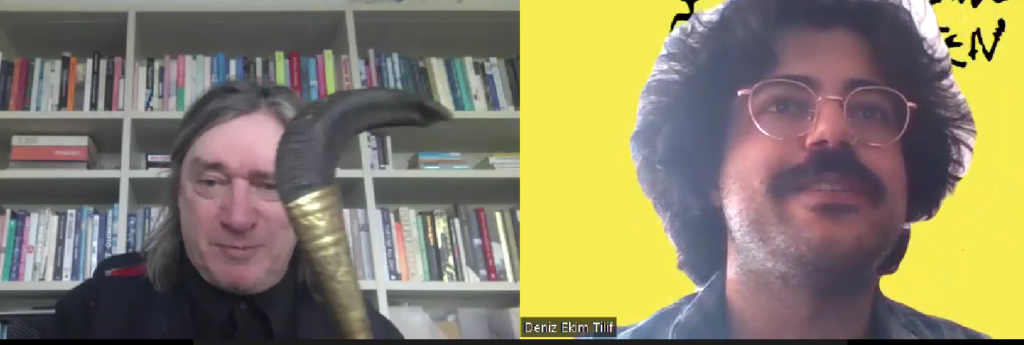Cover Photo Credit: Thomas Rabsch
The founder and vocalist for the pioneering industrial outfit Einstürzende Neubauten as well as an ex-member and co-founder for Nick Cave & The Bad Seeds, it will never be an exaggeration to underline the legendary status of Blixa Bargeld. Now that Einstürzende Neubauten is back with their new album Rampen (apm: alien pop music), we got a chance to talk to the man himself. One thing we immediately notice: His voice is insanely charismatic. Here is everything that he told us.

I want to start off with a rather unorthodox question: Do you have any interest in astrology? Because my friend and I think you’re the perfect example of a Capricorn.
(laughs hard) The perfect example of a Capricorn… I studied astrology early on in my life. I know a lot about it. A lot that most people don’t know. For the Capricorn, I researched that especially.
Most of the signs actually go back to the Babylonian times. The sign next to Capricorn, which is in most Western ways called Aquarius, is usually depicted as a man emptying some kind of water device. That figure, originally in Babylon, is the goddess of the rivers Euphrates and Tigris. She has two of those, emptying the two devices, because she’s the goddess of Euphrates and Tigris. One of the highest goddesses in the Babylonian Pantheon. She has a helper, and that’s the goatfish. The goatfish is, of course, the Capricorn. The goatfish lives in the Babylonian underworld, where all these creatures that represent possibilities live.
There are creatures with asex, several sexes or no sex at all. They are creatures with a face, without a face, or with several faces. I don’t think they’re, in that sense, monsters. They are possibilities. And one of those possibilities is the goatfish.
He comes to the overworld in the daytime to teach mankind everything. He teaches mankind how to differ the different seeds and flowers. That’s an original quotation. He teaches about the stars and the planets. He teaches language, writing, and architecture.
And then at night, he disappears again into the Babylonian underworld cosmos, because that’s a whole cosmos underneath, not just some lake. That is the origin of the goatfish. And in a way, yeah, I do see myself like that kind of mythical animal. In a way, I do that.
There are some other good examples of the Capricorn. David Bowie is maybe one of them.
Yeah. And he’s an Aquarius rising, too. That also complements his personality.
Yeah, yeah. That makes him so weird in that great sense. Both are Saturn-ruled signs that were in the Babylonian astrology. They are very connected, those two. I’m not that. I’m a Leo rising.
Yeah, that makes sense.
I broke my leg in 2023, in February. I went to Barcelona, to an antique shop to find myself a walking cane. It was a shop with lots and lots of canes. I was thinking, maybe I can find one that actually speaks to me. And I found this. That’s a mountain goat that you see. From the collar here, there’s an ancient king and a lion.

So it was basically for you.
And it is for a left-handed person.
Wow.
So I thought, this is not just speaking to me, this is yelling at me!
I would agree.
These things penetrate my writing. Yes. It’s not just astrology. It’s one of the fields of metaphors that I usually harvest, though.
There is a lot about astrology and astronomy. I use words like Zenith and Nadia, and I take a lot from the images. I have written a whole song with Teho (Teardo) called “Ziegenfisch” that talks about just what we have been talking about in the last ten minutes. I take a lot from mythology because it is a language that was able to trade information and truth before there was an adequate language for it.
On the last Einstürzende Neubauten record, Alles in Allem, I have this song called “Seven Screws”, where I temper with the idea of an ocean of possibilities, and I end up with the words non-binary. So I take things from mythology, I take things from scientific language, and I like to replant it all into a different surrounding. I like replanting metaphors into different settings, to have new roots in something that wasn’t there before, to be able to look at the surroundings differently, and also look at this particular language in a different way.
Thanks for that detailed answer. I really appreciate it, and for “Seven Screws”, I think it is one of your career-defining songs in a way. It is so symbolic and powerful.
Ja. Very important. It is the good thing. That great thing also happened on this record with “Gesundbrunnen.”
If I hear from people that they were actually able to get a sense and probably strength out of my really cryptic way of writing, then I have enough validation coming back to me to make me really happy about all that. I write things not for the majority, I’m fully aware of that, but I am also writing in such a cryptic way that it is pretty hard to come to a meaning and to decipher it. But if you are in a particular situation where you can take meaning out of that, then I have enough validation for myself to continue doing this.
Your last few sentences actually remind me of a quote on art that I really love: “Art is never finished, only abandoned.” It makes me think that when a piece is formally finished, it sails on to a new life, in a sense, to find new meanings and interpretations for art enthusiasts. Do you agree?
Yes, hopefully.
Obviously, I have a few questions on your new album Rampen (apm: alien pop music). When I interview artists on a new album, I tend to ask about the two tracks easiest and hardest tracks to create. Considering the songs on this album were born improvised anyway, did they all flow with more or less the same ease?
The music did not really change very much in the recording process. We maybe made some minor changes, things like saying “This is too long” or that it should start again or whatever, but they did not alter very much. But of course, I fleshed out the lyrics. In the original improvisations on stage, most of the songs didn’t have that much words. There was a skeleton that I worked with, and then I started to create some meat that I can hang on to these bones. To form a complete body.
Going back to the songs’ earlier traces in the format of initial improvs, do you have specific memories associated with these songs? Maybe in terms of where you performed them, or maybe a specific performance reminds you of a city?
Ja. None of the pieces are actually connected with the place where they were performed. Of course, I can’t talk about the others, but I made decisions on what language I will sing in. During the improvisation in London, I sang in English. And when we improvised in Vienna, the Viennese Austrian has a particular dialect. I thought, okay, well, they have that. And I answer that with Berliner Schnauze, which is the Berlin dialect. So I sang the Berlin dialect in Austria, and I sang in English in London. But the subjects and the fragments that I’m using for these particular improvisations have nothing to do with the places where we played.
I want to talk about the use of humor in your music. In a recent interview, you complain about being perceived as a way too serious band.
We are a German band, and that already means to a lot of people that we don’t have any humor. But I think it has been greatly overlooked. If there is a German band without any humor, it’s probably Rammstein.
That’s a fair point. And that misconception, I believe, can apply to most artists producing relatively serious music. For instance, I think Leonard Cohen’s music is way more joyous and humorous than most people make it out to be. There are legitimately hilarious lines in his writing.
Ja. That’s true. Indeed. Indeed.
What I know about Leonard Cohen’s way of writing is that he is a very, very slow writer. He says he sometimes needs years to come to a result with a particular text, and he takes lots of little disparate notes about this and that. And then finally one day, he puts them together. There is usually a lot of language humor in Leonard Cohen’s writing.
He’s been totally misused and misunderstood with this endless “Hallelujah, hallelujah, hallelujah” playing everywhere. They all first think it is by Jeff Buckley. And then, they think it’s about Christianity. That is not Cohen. I always liked him.
Do you know the joke from the last time Leonard Cohen met Bob Dylan in Los Angeles? The last time when Leonard Cohen met Bob Dylan was in Los Angeles, in a car. This is a story that Leonard Cohn told. Okay. They come back to the old discussion about the comparison between the two of them. Bob Dylan says to Leonard Cohen: “You know what? I am not number one. You are number one. I’m zero.” (both laugh)
That is one of the driest wits I ever heard. For your music, a humorous spirit persists in this album too: You referencing The Beatles’ White Album through the album cover and format, you listing your Amazon purchases for the lyrics of “Pestalozzi”…
So you know all that already. Did you also know that one of the last purchases that appears in the song is called A Cellarful of Noise? Well, if you google it, you will find out what that really is. It’s the autobiography of Brian Epstein.
Okay.
And John Lennon used to make a joke about it, saying it should actually be called A Cellarful of Boys. (laughs)
I will check that all out.
What else do you want to ask me?
While we’re talking about The Beatles, what did you think of their last song that just came out? Have you heard it?
Ja. Left me fairly unimpressed.
If the color of this album is yellow, name the color of the following albums: Kollaps, Silence is Sexy, and Alles in Allem.
Unfortunately, when you say these names, I automatically see the covers. But you can see something else connecting them. For Kollaps, obviously, we are referencing Ummagumma by Pink Floyd because of the photo on the back. We’re doing a Pink Floyd cover photo. For Perpetuum Mobile, we are referencing Let It Bleed by The Rolling Stones. I don’t think we’re referencing anything in Silence is Sexy. That album was quite an achievement. We played some very indestructible songs on that one. We didn’t even plan it to be a double album. But in the end, we actually had a double album.
Silence is Sexy exists as vinyl, but that was a time when CD was the standard. So everything in the actual release of that record was kind of formatted for CD. While this particular new record, Rampen, has been definitely thought out as a double vinyl album. There are four sequences, four different sites. All sequences were planned. Like George Martin did. It has an opener. There is an end to side B on the first record. There is a long side three, which is one long river running through “The Pit of Language,” “Planet Umbra,” and “Tar and Feathers.” It’s like Tago Mago by Can, or another classic or psychedelic album. And then there’s side four, which also has an opener. And it has a last song that only can be the last song. So this is no longer thought of as a CD. It’s thought of as a vinyl double album. Again, like in the old times.
There were originally 25 songs recorded for this one, right?
There were 25 rampen. We decided which of those were worth working on. So you could say there were 15 good enough and ten that were not that good.
I was going to ask whether those you did not include in the album might see the light of day. I guess not.
No, but you can find them as live performances on YouTube. The ones that we played originally on stage is easily found on YouTube. We went through a very simple process. We listened to all the rampen. Each member gave them a star or not. And then those that had the most stars, we worked on.
This is a question a friend of mine asks to you: Where does music end and noise begin?
That’s very much in the brain of the listener. I can tell you that by the time we did Kollaps or something like that, that was still very much noise. Since then, the whole field of popular music has changed so much that in the level of what is considered music, noise has become so much more acceptable. Especially from influences from hip hop. A lot of that noise is so much incorporated in pop music nowadays that you can no longer say it’s noise. It’s there. It’s the form of organization that makes the difference. If you organize noise, within no time, you are in music territory.
But then, I’m also a Cageana. A Cageana is somebody who likes John Cage. I also cherish the idea of not organizing, of not getting your power over the scenes you hear. And that will, of course, always stay in contrast to the organized form of audible sensations. If they are noise or if it’s a clarinet, it doesn’t really matter. The organized sensation will automatically become music. If you don’t want to organize something and you’re against it, it will always stay noise.
Yesterday I thought, “Huh, okay. If you want to really look at it, Rammstein is as much Richard Wagner as Einstürzende Neubauten is John Cage.”
I think that makes sense.
So these things will never come together.
Alman bir grubuz, bu da halihazırda kimilerinin gözünde mizahtan tümüyle yoksunuz gibi bir anlama çıkıyor. Ama mizahi yönümüz nadiren hak ettiği takdiri toplamıştır. Mizahtan yoksun bir Alman grup varsa o da Rammstein olsa gerek.
Blixa Bargeld
Among your discography, what do you think is the one record that even your fans tend to overlook?
I really don’t know. I know that we made one major mistake, and that was signing a record contract with Some Bizarre in London. They still have not paid us. They’re still f.cking with our records. And that makes a big body of our work, which is sometimes difficult to get, because we are in a constant fight with this company.
We made four records with them: Zeichnungen des Patienten O.T., Five on the Open-ended Richter Scale, Halber Mensch and Haus Der Lüge. They make, of course, a big body of our work. To overlook any of those four records would be overlooking a big piece of us. We are still in fights with them. We never get any money from it. They are still f.cking around with it. They appear on streaming platforms and disappear again.
So it might be difficult to actually find a real version of these pieces. Zeichnungen des Patienten O.T. is probably one of the major scenes to look at, because it explores more materials and more sounds than any of our other records. But then, they’re all my dear children, in a way.
let’s imagine we are 100 years into the future in a Musicians Theme Park, where every artist or musician involved gets their own memorial stone with a specific lyric by them written on it. What do you think would be written on yours?
(laughs) I don’t know. I can’t talk for the whole band, but I would I have used the sentence “Lös mich auf wie Zucker wenn du die Zeit dafür findest” from “Von wegen” in the album Alles wieder offen. “Dissolve me like sugar if you find the time for it.”
You can check out Einstürzende Neubauten Bandcamp profile here.



